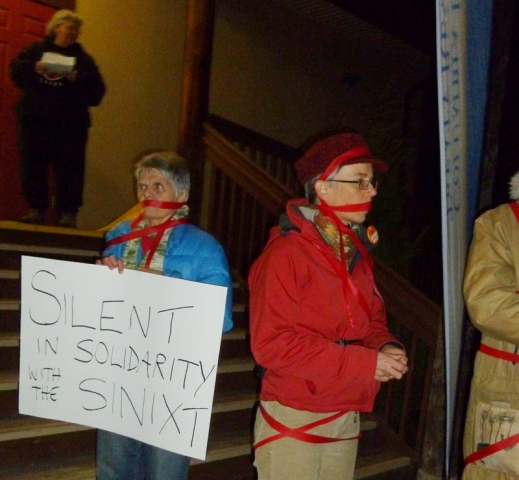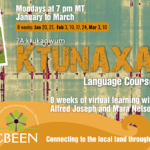Columbia River Treaty meeting gets lots of feedback
By Suzy Hamilton, The Nelson Daily
A packed house at the Nelson Rod and Gun Club greeted provincial and local officials at the second Columbia River Treaty Review information meeting Tuesday night.
“And we’re especially pleased to see so many young people here,” said Kathy Eichenberger, leading the review process.
Eichenberger is based in Victoria.
Outside the building a dozen protesters were wrapped in red tape and muzzled, to highlight the fact that the Sinixt Nation, based in Vallican has not been included in formal consultations.
Other bands including the Ktunaxa in Creston have been in private consultation with the review committee.
Many of the protesters then took part in the round table discussions to air their support for the Sinixt, whose traditional territory extends from northern Washington to Revelstoke.
The review is designed to gather public input on whether or not BC and the federal government should opt out of the treaty in 2024.
Either country can terminate most of the provisions of the treaty after September 16, 2024, providing at least 10 years’ notice is given.
A Columbia River Treaty Local Governments’ Committee was struck to help basin residents and local governments engage in decisions around the future of the Columbia Basin Treaty before 2014.
Last spring residents voiced their concerns citing flood control, loss of First Nations archaelogy and culture, power production, fair share of benefits, decision making processes, continued access to water, healthy ecosystems, salmon and economic opportunities as major concerns
Tuesday night’s session received similar concerns after participants heard several technical reports from BC Hydro representatives.
The crowd also heard that climate change will be a factor with predictions that south of the border will see more impact from less snowfall, warmer and wetter winters, and that there will be a need to co-ordinate reservoir storage with the US.
Participants were given three scenarios: Terminate the treaty, continue the treaty or add to the treaty. The risks and benefits of all three options were presented and later discussed at round table breakouts.
Terminating the treaty would give Canadians more control of water levels, the meeting heard, but would mean a loss to the province of an average of $200 million per year from the downstream benefits.
The Columbia River Treaty is a transboundary water management agreement between the US and Canada, ratified in 1964.
The treaty has brought significant flood control and power benefits to British Columbia, although the resulting reservoirs flooded 60,000 hectares of valley bottom land, displacing thousands of people.
The province of BC now receives half-share of the downstream power benefits from the additional power that can be generated in the United States.
The Columbia Basin Trust was created in 1995 to support social, economic and environmental well-being in the Canadian portion of the Columbia River basin.
Anyone wishing to comment during the review process can go to HYPERLINK “http://www.cbt.org/crt” www.cbt.org/crt
Eichenberger stated that another public meeting will be planned for the future in Nelson.

























